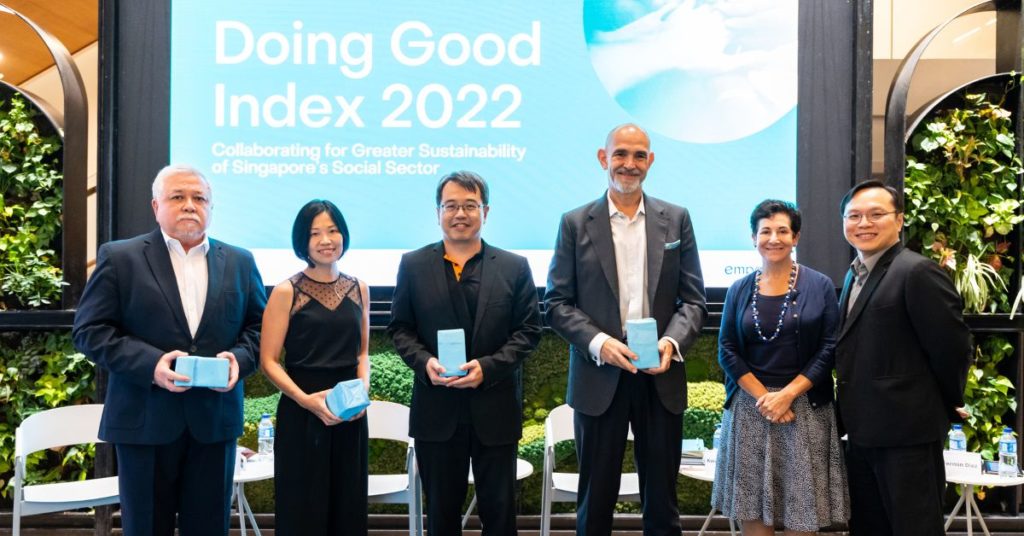5 min read
Covid-19 has exacerbated income inequalities and social disparities across Asia, serving as a force multiplier for trends already in place. A social impact study by the Centre for Asian Philanthropy and Society (CAPS) – the Doing Good Index – shows how to maximize philanthropic and policy responses to cope with these post-Covid challenges. In partnership with Empact, the study identifies opportunities for the Singapore government to do more for society, as well as how private/corporate donations must play their part in meeting people’s needs.
The Doing Good Index is a study of the social investment landscape in Asia. It exposes the underlying structural conditions preventing the region’s social sectors from thriving, whilst highlighting enabling factors that can empower governments, companies, philanthropists, and social delivery organizations (SDOs) to tap resources and work together to meet Asia’s challenges. The Index can help philanthropists, policymakers, researchers, social delivery organisations (SDOs) and the public understand what levers can best increase philanthropic giving in their economy
“Two-thirds of those newly forced into poverty live in South Asia, East Asia, and the Pacific, underscoring the need for philanthropic giving in these economies.” said Mr. Ronnie Chan, Chairman of CAPS. “The pandemic has forced an immediate and united response from individuals, companies, and governments, demonstrating how a collaborative ‘Asia for Asia’ philanthropic approach can guide the region’s recovery and rehabilitation. That said, we need to urgently do more if we are to protect and support the most vulnerable members of our society.”
The Singapore Launch of the Doing Good Index 2022
Co-organised by CAPS and Empact, the Singapore findings of the Doing Good Index 2022 were launched on 12 July 2022 at Temasek Shophouse, which saw 50 in-person attendees and 87 virtual participants in attendance, all of whom gathered to learn more about key insights from the Index, as well as to hear more about sustainability in the social sector.
“Singapore remains a top performer on the Doing Good Index with efficient and effective laws and policies in place to support the welfare of its people” said Peter Yang, Founder and CEO of Empact. “But the pandemic has challenged the capacity of the social sector to meet Singapore’s social needs, and highlighted the need to work together more efficiently and effectively.”
1. Impact of Covid on SDOs in Singapore
– 47% saw an increased demand for their product/ service
– 49% of SDOs saw their income increase
– 38% of SDOs saw their income decrease
– Over the next 12 months, SDOs in Singapore say their top three needs are funding (75%), more staff (52%) and collaboration with others (49%)
2. The domestic funding landscape
– 79% of SDOs believe that the level of domestic funding remains low. This is down 4% as compared to 2020.
– The top two reasons are that (a) people would rather give directly to beneficiaries and (b) people believe that supporting the underprivileged is not their responsibility
3. Where Singapore does well
a. Enabling regulations and tax incentives.
– SDOs find laws easy to understand and believe that social sector laws are generally enforced.
– Tax incentives for charitable giving are the highest in Asia
b. Government and the social sector work together.
– Singapore is the country in Asia where the highest proportion of SDOs receive government grants.
– Government grants also make 29% of an SDO’s budget, which is double the Asia average.
c. Companies are engaged
– 85% believe that companies are supportive of the social sector
– 69% of SDOs receive corporate funding and work with corporate volunteers, higher than the rest of Asia
4. Where there is room for improvement
a. Attracting and retaining talent
– 83% of Singaporean SDOs say that it is difficult for the organization to recruit staff.
– In Singapore, 98% of SDOs—the highest proportion in Asia—report there is a public perception that nonprofit staff should earn less than their private sector- counterparts.
b. Capacity building and incorporation of technology
– Only 5% of Singaporean SDOs receive consistent support for capacity building, lagging behind the 11% Asia average.
c. Leverage cross-sector collaboration
– 79% of SDOs collaborated with other SDOs pre-Covid
– 58% of SDOs entered into new collaborations during Covid
To read the full report of the Doing Good Index 2022, you may visit this page
Collaborating for Greater Sustainability of Singapore’s Social Sector
The presentation was then followed by a panel with Keith Chua (Trustee, Mrs Lee Choon Guan Trust Fund), Claire Wong (Executive Director & Head, DBS Foundation), Tan Kwang Cheak (CEO, Agency for Integrated Care), and Dr Fermin Diez (Deputy CEO, National Council of Social Service), in a discussion moderated by Yap Keng Hwee (Deputy CEO, Empact).
Key points that were discussed:
1. Impact of Covid-19 on the social sector in Singapore
– There has been a growing awareness from companies that they should be part of creating impact. Individuals have also stepped up voluntarily to respond to needs of the day.
– Covid-19 has pushed the social sector to adopt technology and digitalise. Many organisations have become more willing to invest in technology and adopt new models of working.
– Moreover, the pandemic has also raised the issue of mental health of both social delivery organisations’ staff and beneficiaries. There needs to be an increase in HR capabilities and policies to deal with burnout and mental health issues.
2. Critical sustainability challenges social delivery organisations face in Singapore, and what ecosystem partners can do
– The 3-year mark after forming an SDO tends to be where challenges set in. It is important for ecosystem partners to support these organisations to ‘cross the chasm’.
– One form of support is to take a longer-term approach to funding models, so as to allow time for the SDOs to mature and show value.
– Next, capacity building is a key aspect of support to ensure sustainability in the sector. Apart from direct funding, funding can be provided to enhance capabilities of the organisation, such as funding to adopt technology, which is what NCSS’ Community Capability Trust seeks to achieve.
– Skills and expertise from companies and foundations can also be used to help SDOs. For example, DBS foundation (a) channels their bank’s skills to help with Human Resource. Their HR department has customised a transformation leadership programme for social enterprises, which they run for growth-stage enterprises; and also (b) help with burnout through a resilient leaders programme they run with Bettr Barista, for new grantees.
3. What funders can do to mitigate the trust deficit in the social sector
– Funders should err on the side of compassion when reviewing outcomes, it is more
important to build a relationship of trust and understanding.
– From the point of view of SDOs, it is equally important to learn to convey to donors how their money was well spent to create additional impact that wasn’t there before.
– It is also important to help SDOs improve capabilities to measure outcomes, so as to improve trust with funders and investors.
As we move towards a post-pandemic world, the sustainability of the social sector in Singapore remains an important issue that needs to be addressed by various ecosystem partners. More than just providing funding, sustainability also requires capacity building, growing talent, and supporting the mental health of staff and beneficiaries, all of which should leverage cross-sector collaborative efforts to do so.


















